Prominent Iranian figure threatens to destroy Qatar
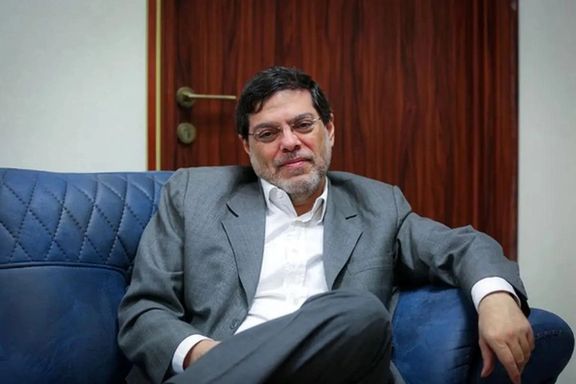
A former member of Iran’s nuclear negotiating team and a frequent voice on international media defending Tehran’s policies has said Qatar should be bombed if Iran’s nuclear facilities are targeted.

A former member of Iran’s nuclear negotiating team and a frequent voice on international media defending Tehran’s policies has said Qatar should be bombed if Iran’s nuclear facilities are targeted.
Mohammad Marandi, speaking about a possible US attack on Iran’s nuclear facilities, tweeted, “Slight problem. The US Al Udeid air base in is tiny Qatar. In case of aggression, the natural gas facilities and infrastructure in Qatar will be totally destroyed. Hence, there will be no natural gas from Doha. Hence, there will be no Qatar. Things won’t end there either…”
The post on X was apparently later deleted, but some websites in Tehran had republished the text of the tweet.
Marandi's remarks are surprising given Doha's close relations with Tehran and its mediating role between Iran and Western countries.
Although Tehran’s government media did not report about the tweet, some semi-independent websites simply reported it.
Heshmatollah Falahatpisheh, a prominent foreign policy expert and former senior lawmaker known for his critical stance on foreign policy issues, responded with his own tweet refraining from naming Marandi.
“...and this time, a threat to attack #Qatar.
For years, a dangerous faction has been undermining opportunities for de-escalation and lifting sanctions on Iran, while simultaneously pushing to make the country's foreign policy self-destructive.”
In 2022, following Russia’s invasion of Ukraine and the resulting disruption in Europe’s energy supplies, Marandi opposed reaching a nuclear deal with the West. He argued that as Europe faced a harsh winter, it would ultimately capitulate to Iran’s demands. Eighteen months of multilateral negotiations collapsed in September of that year.
Now, two years later, Iran is facing a severe energy crisis. Decades of underinvestment have significantly reduced natural gas production and electricity supplies, resulting in widespread blackouts across the country. While internal mismanagement has played a role, US sanctions are widely regarded as a key factor behind the deterioration of Iran’s infrastructure.
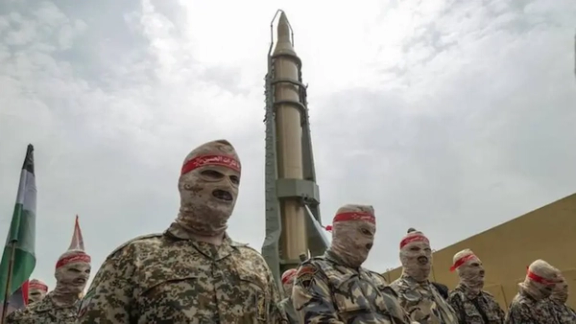
An annual US State Department report called Iran the world's leading state sponsor of terrorism for the 39th year running, accusing Tehran of using its allied armed groups to destabilize the Middle East.
The annual Country Reports on Terrorism (CRT) mandated by Congress has consistently named Iran thus since 1984, citing its extensive support for groups designated as terrorist organizations such as Hezbollah, Hamas and the Houthis.
While other countries, such as Syria, North Korea, and Cuba, have been listed as "state sponsors of terrorism" in the report, Iran is consistently singled out as the most prominent actor, a designation it has held since five years after the inception of the Islamic Republic following the 1979 revolution.
No country preceded it in the designation.
The latest 2023 CRT report released on Thursday evening accused Iran of facilitating a wide range of "terrorist and other illicit activities," primarily through the Islamic Revolutionary Guard Corps-Qods Force (IRGC-QF).
“Through the IRGC-QF, Iran provided funding, training, weapons, and equipment to several US-designated terrorist groups in the region responsible for conducting these destabilizing attacks,” the report said.
Following Hamas’s October 7 attacks on Israel, Iranian-backed groups exploited the conflict to advance their objectives, the report said.
“Although there is no evidence that Iran knew about Hamas’s October 7 attacks on Israel in advance, its long-standing material, financial, and training support to Hamas enabled Hamas to execute the attack,” the report added.
In Iraq and Syria, Iran supported Iranian-aligned militia groups (IAMGs), including Kata’ib Hezbollah, Harakat al-Nujaba, and Asa’ib Ahl al-Haq, with advanced weapons, training and funding.
“Iranian forces have backed militia operations in Syria and Iraq directly, with artillery, rockets, drones and armored vehicles,” the report noted, emphasizing Tehran’s use of routes through Syria to arm Hezbollah and other groups.
The report also highlighted Iran’s support for Hezbollah in propping up the President Bashar al-Assad in Syria.
“Hezbollah fighters have been used extensively in Syria to support the Assad regime,” the report said, adding that Iran viewed Assad as a crucial ally. The report also documented Iran’s role in recruiting Shia fighters from Afghanistan and Pakistan to bolster the Assad regime, often through financial incentives or coercion.
The report further accused Iran of providing weapons, such as drones and missiles, to the Houthis in Yemen, who intensified attacks on civilian shipping in the Red Sea, disrupting maritime commerce and global trade. The Houthis also seized commercial vessels and attacked Israel with missiles and unmanned aerial vehicles.
Beyond the region, Iran was accused of orchestrating or supporting plots against dissidents and other perceived enemies abroad, including an assassination attempt on an Iranian dissident in New York City and targeting Israeli and Jewish individuals in Cyprus.
The report also detailed threats against Iran International, noting, “In 2023, a United Kingdom court convicted a man for attempting to gather information for terrorist purposes.”
Iran had hosted senior al-Qa’ida leaders, the State Department further alleged.
“Iran has allowed al-Qa’ida facilitators to operate a core transit pipeline through Iran since at least 2009, enabling al-Qa’ida to move funds and fighters to South Asia and Syria, among other locales,” it said.
The report further accused Iran of violating international laws by attacking commercial vessels in the Arabian Sea and the Gulf of Oman, seizing ships in the Strait of Hormuz.
As in the previous year, the State Department concluded that the IRGC-QF remains Tehran’s primary mechanism for cultivating and supporting "terrorist" activity abroad and emphasized Iran’s use of proxies to shield itself from accountability while promoting destabilizing policies globally.
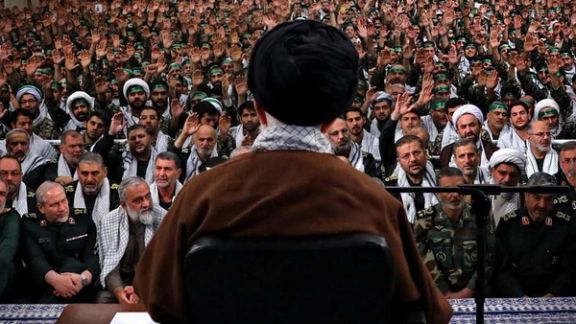
If you had asked Donald Trump’s former Iran envoy Elliot Abrams last year how he assessed Iran's strength, he would have told you its fearsome array of armed affiliates was a powerful guarantee of its staying power.
“I would have thought Iran is riding high," the veteran US foreign policy hawk said. "Their system of terrorist proxies in the region is a brilliant system and it's working,” Abrams, the former special representative for Iran during the first administration of Donald Trump told Iran International on Eye for Iran.
Now, he says, its fortunes are at a low ebb.
The sudden uprooting of Iran’s most important Arab ally, Syria's President Bashar al-Assad, demonstrates just how brittle Iran may be.
“Iran made many advances, but now in the last year in particular, a lot of it has collapsed. Iran looks more isolated and weaker today,” said Abrams.
"This must be a terrible, terrible turn of events to have lost Assad, your only real important Arab ally, to have lost Hezbollah as a fighting force after, who knows, $40 billion dollars of investment over decades, to have lost the Arab figure closest to you, [Hassan] Nasrallah,” he added.
Days after taking credit for the collapse of Assad in Syria, Israeli Prime Minister Benjamin Netanyahu addressed the people of Iran in his latest of a series of video messages to Iranians, saying the downfall of the Islamic Republic is near.
“Your oppressors spent over $30 billion supporting Assad in Syria, and only after 11 days of fighting his regime collapsed into dust,” Netanyahu said.
Iran's Supreme Leader Ali Khamenei in a speech this week characterized talk of Iran’s weakening position in the Middle East as criminal, vowing with little apparent grasp of the enormity of his loss that Syria could be won back.
"The territories that have been seized in Syria will be liberated by the brave Syrian youth. Have no doubts that this will happen," Khamenei said, refusing to acknowledge the failure of the so-called axis of resistance.
Such enormous upheavals seemed unthinkable only days ago.
Iran’s Foreign Minister Abbas Aragchi met with Assad on Dec 2. as Islamist-backed forces were just beginning their lightning march to victory. Assad was distressed and allegedly admitted that his army was too weak to fight, according to Reuters, citing a senior Iranian diplomats.
The collapse of Syria now allows Israel room to launch strikes on Iran, unencumbered by Assad's air defenses - which the Jewish state attacks along with hundreds of other military infrastructure targets this week.
“They're clearing the route to fly. There are no air defenses now, something they [Israel] used to have to worry about," Abrams said.
"They've destroyed the air defenses that Assad had built up. They've shown they've destroyed the S-300 system in Iran itself,” he added, referring to Russian-provided air defenses knocked out in Israeli strikes on Iran on October 26.
“What happened in Syria," said Abrams, "should remind the West that these regimes are like the Soviet regime. No matter how strong they appear, no matter how large their army, they're fundamentally brittle because inside, everyone knows that the people of the country want the regime to fall.”
Iranians took to the streets in nationwide protests in 2022 after the death of Mahsa Jina Amini who died while under police custody for allegedly not wearing the country’s mandatory hijab properly.
A survey conducted in 2023 by Gamaan, a Netherlands-based institute, found that 60 percent of Iranians want a different leadership or "transition from the Islamic Republic".
The demise of Syria's dictatorship after half a century of family rule seemed a distant prospect two weeks ago and that is precisely why Abrams believes the future may be bleak for the Islamic Republic.
“I think we cannot predict it. Who a month or two ago was predicting the fall of Assad? Who predicted the fall of the Soviet regime?”
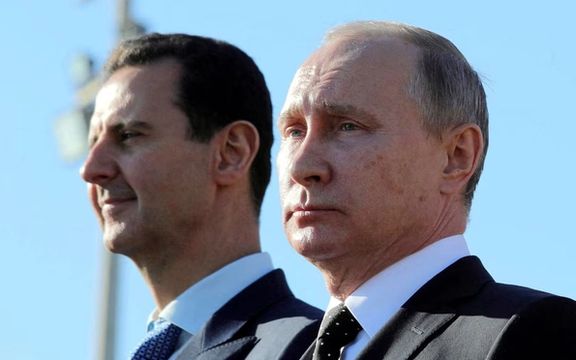
As rebels gained in the days before Bashar al-Assad's flight from Syria, his appeal for help from Moscow was rebuffed but the veteran autocrat held off seeking Iranian military support to avoid triggering Israeli retaliation, Reuters reported.
In the days leading up to his downfall Assad sought military aid from Russia, whose intervention in Syria's civil war in 2015 swung the conflict in his favor.
On November 28, Assad traveled to Moscow to plead for military intervention following a rapid advance by Syrian rebel forces, including the capture of Aleppo by Hayat Tahrir al-Sham (HTS) Islamists.
However his request was dismissed by the Kremlin, with Russia unwilling to engage further militarily, according to three regional diplomats cited by Reuters.
Despite the rejection, Assad reportedly misled his commanders, alleging that military support from Moscow was imminent. Hadi al-Bahra, head of Syria’s opposition abroad, cited sources within Assad’s inner circle confirming Moscow had rejected the request.
The Kremlin has since said that its priority is now the conflict in Ukraine, with spokesperson Dmitry Peskov emphasizing Russia’s earlier efforts to stabilize Syria.
Four days after Assad's Moscow visit, Iranian Foreign Minister Abbas Araghchi met with Assad in Damascus.
By then, Assad’s forces were in disarray, and he admitted to Iranian officials that his army was too weak to resist the rebels. However, Assad refrained from requesting direct Iranian military deployment to avoid provoking Israeli retaliation against Iranian forces or even Iran itself, according to senior Iranian officials cited by Reuters.
The ouster of President Bashar al-Assad, whose family had ruled Syria for over five decades, dealt a significant blow to Iran, depriving Tehran of one of its oldest and most reliable allies. Damascus was a critical link in Iran's so-called "Shi'ite Crescent," which extended its influence through Iraq and Syria to its Lebanese ally, Hezbollah.
Meanwhile, the aftermath of Assad's fall has sparked rare criticism of the Iran's Revolutionary Guards and its Quds Force commander, Esmail Qaani.
Ultra-hardliners have vented frustrations in online forums like Telegram and Eitaa, questioning why flights and supply routes to Damascus were halted and why the Qods Force failed to act decisively.
Iranian politicians and media are now grappling with the implications of Assad's fall on Tehran’s future ties with Damascus. The government is also under pressure to justify Syria's significant financial and military investments since 2011.

Donald Trump’s maximum pressure policy was never aimed at regime change, his last special envoy for Iran told Iran International. It was about making a deal.
Achieving a comprehensive plan to halt Iran’s nuclear and regional ambitions is likely the endgame for Trump’s second presidency, said his former special representative for Iran during the first Trump administration.
Elliott Abrams, a veteran hawk, told the Eye for Iran podcast that most people remember maximum pressure but do not properly comprehend what the goal was.
“For better or worse, it was not the overthrow of the regime,” said Abrams “His criticism of the Obama deal was that it was time bound, and it was not comprehensive. It didn't deal with Iran's missile program or Iran's support for terrorism.”
The president-elect is still striving for such a deal, according to Abrams.
The former Iran envoy fears Trump’s zeal for a deal could get him dragged into meaningless negotiations which buy Tehran time to advance its nuclear program.
Tehran
“Iran will trap him [Trump] in negotiations that will go on and on and on and on and on while they are trying to advance with their nuclear program.”
Iran Foreign Minister Abbas Araghchi said that they are prepared to cooperate with the United Nations nuclear watchdog. Araghchi made the remarks during a telephone conversation with the International Atomic Energy Agency (IAEA)’s Director-Genral Rafael Grossi on Monday.
Trump’s former Iran envoy believes Iran's sudden willingness to cooperate with the IAEA after shunning its inspectors and boosting its uranium stockpile is all part of Iran’s plan to get the president-elect to the negotiating table.
Abrams sees some of Trump’s cabinet picks like senator Marco Rubio for secretary of state and Mike Waltz as national security adviser as guards against any feints by Iran. Both are seen as hawkish Republicans and long-standing critics of Iran.
“They have robust records of understanding Iran and understanding the evil of the regime. And so, they are obstacles to that happening, which is a very good thing,” he said. "I'm just hoping that people like Waltz and Rubio will say to the president when he becomes president again, this is the Iranian game. Don't fall for it.”
But the possibility of the president-elect being fooled is not inconceivable, according to Abrams, and the new administration will have some divergent voices such as Tulsi Gabbard, Trump’s pick of director of national intelligence. Gabbard has expressed sympathy for the outlooks of Syria’s former ruler Bashar Al-Assad and Russian president Vladmir Putin.
“The regime in Tehran knows this and they're very clever and they will try to play off of this,” added Abrams.
The choices the Islamic Republic faces are difficult.
With Iran’s axis of resistance clearly on the backfoot after 14 months of Israeli attacks, the loss of its most important Arab ally Syria after Assad's swift collapse and Israel's destruction of Iran’s air defense and missile facilities in October leaves Tehran with little room to maneuver.
Will Iran decide to cooperate with the US and adopt a more dovish tack? It seems unlikely to Abrams, who also worked with George W. Bush on US policy in the Mideast.
This spanned the invasion of Iraq over the threat from weapons of mass destruction which were never found, leading to the deaths of thousands of American troops and hundreds of thousands of Iraqis in a war critics say sapped US influence abroad.
A dash to become a nuclear power is the more likely and worrying scenario, he said, cautioning that the Soviet Union’s nuclear status did little to stop its collapse.
Abrams said Tehran must now ask itself in the words of Henry Kissinger: “will they decide to be a nation rather than a cause?"
To watch the full episode featuring Elliott Abrams, watch Eye for Iran on YouTube or listen on Spotify, Apple, Castbox or Amazon.
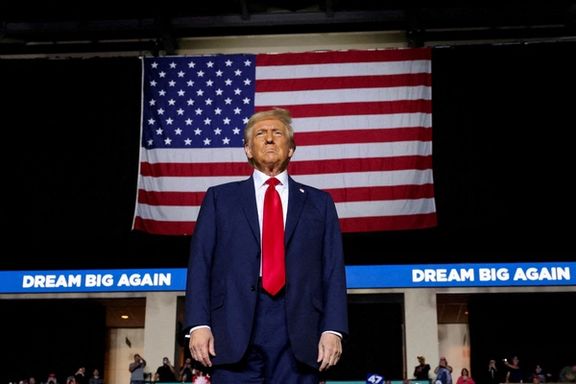
US President-elect Donald Trump is exploring measures to stop Iran from developing nuclear weapons, including potential airstrikes, a shift from traditional diplomacy and sanctions, according to the Wall Street Journal.
"The military-strike option against nuclear facilities is now under more serious review by some members of his transition team," WSJ reported Friday.
Trump has expressed concerns about a potential Iranian nuclear breakout during recent calls with Israeli Prime Minister Benjamin Netanyahu, according to two sources familiar with their discussions, The Wall Street Journal reported, indicating he is seeking strategies to prevent such an outcome.
Also on Thursday, in an interview with Time magazine, Trump refused to rule out the possibility of war with Iran, despite his campaign statements opposing the use of force to overthrow Tehran's theocratic government.
When asked by a Time reporter about the likelihood of war with Iran, referencing allegations by US law enforcement that Iran had sought to assassinate him, Trump responded: "Anything can happen. Anything can happen. It's a very volatile situation."
The Israeli Air Force is reportedly increasing its preparations for potential strikes on Iran’s nuclear facilities, viewing the weakening of Tehran's proxies and the fall of the Assad regime in Syria as strategic openings, according to the Times of Israel. Israeli military officials see these developments as creating new opportunities to address the Iranian threat.
Meanwhile, US National Security Advisor Jake Sullivan, speaking in Tel Aviv on Thursday, reaffirmed Washington’s stance on Iran. He emphasized that the US “remains vigilant against the continuing threat from Iran, including the threat from its nuclear program.” He pointed to the US government’s commitment to ensuring that “the United States of America will never permit Iran to acquire a nuclear weapon.”
Sullivan also said that the balance of powers in the Middle East has shifted dramatically, leaving Iran and its allies in a weaker position while strengthening Israel.
“The balance of power in the Middle East has changed significantly and not in a way that Sinwar or Nasrallah or Iran had planned,” Sullivan said, adding, “We are now faced with a dramatically reshaped Middle East in which Israel is stronger, Iran is weaker, its proxies decimated, and a ceasefire that is new and will be lasting in Lebanon that ensures Israel’s security over the long term.”